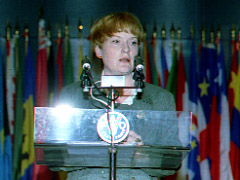


SWEDEN - SUEDE - SUECIA | ||
Her Excellency Annika Åhnberg, Minister for Agriculture, Food and Fisheries of Sweden | ||

There are few tasks in world affairs that could compare in importance and urgency with those before this Summit. It is timely that it takes place during 1996, the International Year for the Eradication of Poverty. It reflects the fact that poverty is the main cause of food insecurity. Effective action in many economic and social sectors to eradicate poverty forms the cornerstone of a successful food security strategy. I welcome that this is given top policy priority in the World Food Summit Plan of Action. Seventy percent of all poor are women. Sweden welcomes the strong emphasis that is given in the Plan of Action to ensure gender equality and empowerment of women. In this context I would like to stress the significance of provisions on reproductive health services. They should in the view of Sweden be carried out in accordance with the decisions taken by the Beijing Conference. The least developed countries, with their high dependence on agriculture, have frequently high concentrations of poor and hungry people. Rapid agricultural growth among the small farmers in these countries, in particular in marginal areas, is a most powerful and cost-effective poverty reduction strategy. Agricultural wage workers are the poorest workers on the earth. The commitments in the Plan to pursue policies that will permit rural people to earn a fair return from the labour are therefore very important. In many parts of the world, international conflicts and internal strife are causing large-scale destruction of agricultural areas and food production. Today we are all shocked and deeply concerned by the immense human suffering of huge masses of refugees in the Great Lakes region in Africa. Urgent action must be taken to save human life and avoid a terrible catastrophe. Rapid coordinated international relief is needed and we all have to give our contribution. The capabilities of the United Nations in conflict prevention, preventive diplomacy, peace keeping and peace building must be enhanced. Let me in this context express my country's strong support for decisive action towards an international ban on the production, distribution and use of anti-personnel land mines. I welcome the call in the Plan of Action for operations to remove these remnants of war. The natural resource base of agriculture is understressed. The conservation and indeed enhancement as well as the sustainable use of the natural capital is a precondition for the achievement of long-term food security. Major decisions and decisive steps for the development of sustainable fisheries, agricultural and food production must be taken with a sense of urgency in all countries, developed and developing alike. Wasteful patterns of consumption and production, in particular in developed countries, must be turned into sustainable patterns of life-style. Sweden intends to be at the forefront in the development of a sustainable eco-cycle society. It is a major goal for the Swedish government. Extensive land degradation must be stopped. National and regional plans for water, watershed and water management techniques must promote environmentally-sound irrigation systems. Activities to maintain the biological diversity in agricultural ecosystems include action to promote policies and programmes which encourage organic farming. An integrated approach to conservation and sustainable utilization of plant genetic resources for food and agriculture must be promoted. The emphasis should be laid on approaches to plant breeding which broaden the genetic base of crops and participatory breeding, specifically adapted to local ecosystems. Farmers' rights should be realized. Fair and equitable sharing of the benefits from the use of plant genetic resources should be ensured. Urgently needed action to develop sustainable food production must be supported by strengthened and refocused national research systems and international scientific cooperation. Science must fully draw upon the experience and knowledge developed over centuries by local people, including indigenous people, the first farmers and fishermen of this planet. The public sector has a major role to play in promoting research in food production of particular importance to poor and food insecure people. The fundamental right to freedom from hunger and the right to adequate food are laid down in the United Nations Covenant on Economic, Social and Cultural Human Rights. For hundreds of millions of people living in chronic undernutrition these provisions are only empty words. I welcome the process set in motion by this Summit to strengthen the implementation of these fundamental human rights. International cooperative action in support of national action is of crucial significance for success in the implementation. I welcome the mobilization of the whole United Nations system in our joint venture to implement the World Food Summit Plan of Action integrated with that of all the major United Nations conferences in the struggle to eradicate poverty. I expect much from FAO, the prime mover of this Summit. A broad popular participation has made the follow-up of the Rio Conference on Environment and Development successful in Sweden. At all levels, 21 committees are actively involved in the urgent and multi-dimensional process of developing a sustainable society. It is my hope that national implementation of the decisions from this Summit will follow a similar pattern. It is my conviction that the actors of civil society must be actively involved in the national follow-up and I would particularly stress the role of farmers and their organizations. It is a precondition for success. | ||
|
|
|
|

 |